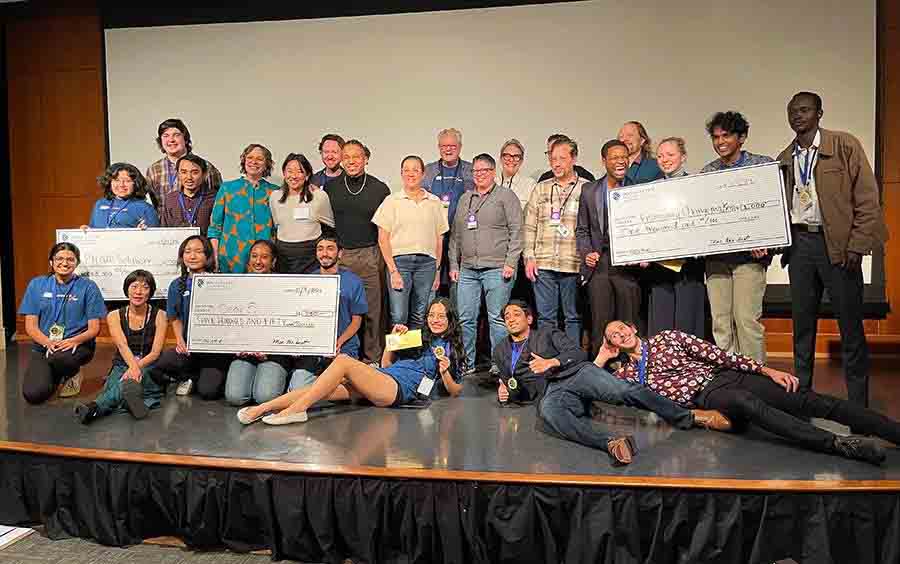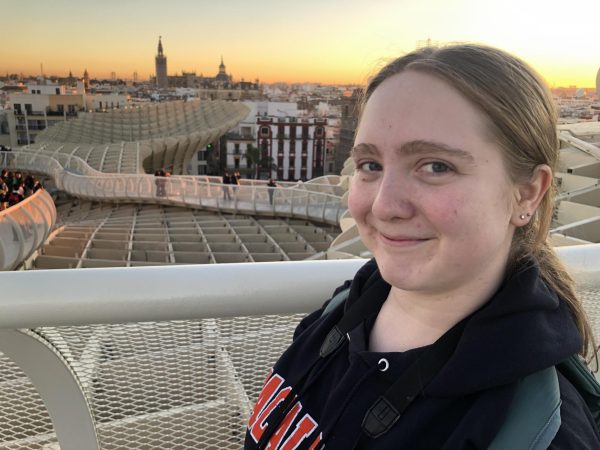Since the start of the school year, Laurice Jimu ’27 knew he was going to win Macathon.
“From the get go, I knew that I wanted to … do Macathon, and … I would tell my boss [Jody Emmings, Director of Entrepreneurship and Innovation] continuously ‘I’m gonna build the team and I’m gonna win Macathon,’” Jimu said. Macathon, run by the Office for Entrepreneurship and Innovation, is a 24-hour competition where teams work to develop and present a product or service that will help solve a real-world problem. Teams can’t develop and plan ahead of time; all work must be done within the time window of the competition. This year, Macathon was held on Nov. 8-9, Friday and Saturday respectively, with opening ceremonies occurring around 5 p.m. on Friday and final awards presented around 6 p.m. on Saturday.
For Ciara Calleja, the office coordinator for Entrepreneurship and Innovation, most of the preparatory work for Macathon revolved around getting the word out and getting students to engage with the program.
“How do we reach students and reach out in any way possible?” Calleja said. “Obviously, if you hit everything, you’re going to affect people differently. Some people will stop and read this. Some people will look up and see this. How do we evolve our ways of communication to best reach people? For example, this year, we did QR codes and start to ramp up.”
This year’s winning team, under the name “Visionary Change Makers,” was composed of Aditya Choubal ’27, Makol Choul ’27, Jimu, Shakti Palraj ’27, Rocky Slaymaker ’27 and Maggie Walker ’27. Their winning design: a soccer ball with a generator that harnesses the kinetic energy gathered from kicking the ball around. The product worked to address the lack of electricity found in refugee camps, based around Choul’s experience with Kakuma Refugee Camp in Kenya.
“I have been involved with the camp from a young age, having spent a couple of years there during my school years,” Choul wrote in an email to The Mac Weekly. “I also volunteered as a teacher for two years before moving to Mac. Additionally, I personally founded two projects that support young refugee children who arrived at the camp unaccompanied.”
Palraj taught at the Kakuma Refugee Camp with Choul this past summer.
While the teams might have struggled to decide on topics and products, the camaraderie — both within teams and between teams — was a main highlight from the weekend. Additionally, the way that different competitors pushed through challenges throughout the event impressed the organizers and judges.
“I’m most surprised at how well the participants just kind of stayed consistent,” Calleja expressed. “Sure, there were moments of lows, and obviously you’re gonna doubt yourself. Imposter syndrome is huge … but there was also so much interaction between each other, the joking, the energy.
“In our Mac bubble, it was as if we were just in this state of camaraderie and peace and togetherness. Despite the different teams, it was a moment where I just felt we could all, especially with our student staff, just sit at the same table and talk and care.”
Macathon’s judging panel included alumni returning to engage with students and help them in the process, providing advice and motivation as necessary. For Kiante Miles ’20, working with students is the best part of Macathon and part of why he keeps returning to judge the event.
“Working with the students hands down is my favorite part about Macathon!” Miles wrote in an email to The Mac Weekly. “The opportunity to come in and help students work on their ideas is truly something rewarding. The [Macalester student] community are some of the most creative, intelligent, and compassionate individuals around, and it’s truly a gift to be able to provide some support for them!”
“Visionary Change Makers” came in first, “Gear 5,” comprised of Pema Dolkar ’25, Alexis Prathammanon ’25, Elizabeth Zewdu ’26 and Isam Hussaini ’26, came in second and “Pirate Solutions,” with Aahanaa Tibrewal ’25, Luke Rowley ’27, Kari Vivar-Cortez ’27 and Basir Talayee ’25, rounded out the podium in third. The teams receive prize money for winning, with first place getting $1,000, second place with $750 and third place earning $500.
“What we’re doing with the fund money is we took the $1,000, and then the owner of Shish gave $1,000 and they made it $2,000 … and then Maggie [Walker’s] grandma also put some money,” Jimu explained. “So now we have a little GoFundMe going on for the refugees that were literally presented for, which is even better. … That is the prize. … The prize is literally, in the end, actually helping people and actually making an impact.”
This desire to keep working to solve the world’s problems gets back to the heart of Macathon. Students are highly encouraged to take their projects beyond the scope of the 24 hours and apply it to the world. Miles, in an address at the closing ceremonies of Macathon, encouraged students to continue moving forward and never stop working towards their goals, even if at times life might feel insurmountable.
“As you move forward, please continue down the path of innovation, resilience and compassion,” Miles said. “And when you get stuck, set your heart ablaze, draw on your resilience, and find a way to put one foot in front of the other and take those next steps.”





